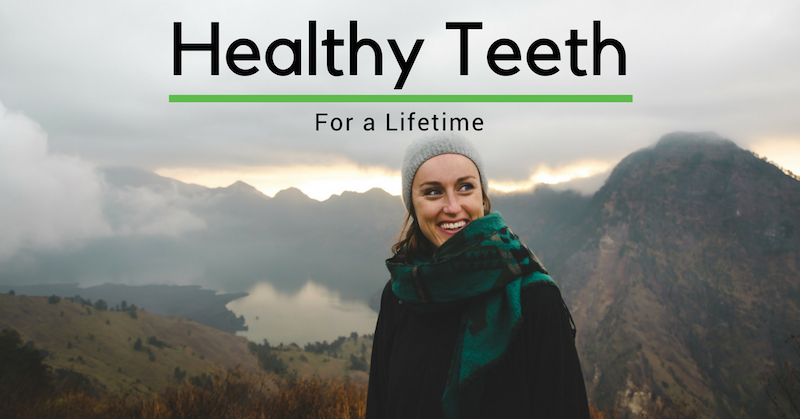
Keeping your teeth healthy is about more than just making sure your smile looks beautiful. Your oral health is integral to your overall health and well-being.
Good dental health centers around taking a well-rounded approach to care, both with who you choose as a dentist and how you take care of yourself on a daily basis.
In this month’s post we’ll go over what it takes, and what it means, to keep your teeth healthy for life. We’ll also give you strategies to ensure you are doing everything you can to keep yourself – your whole self – healthy.

Change How You Think About Dental Health: Your Dental Health is Your Health
The first step towards lifelong dental health and general health begins by changing your approach to oral healthcare. Poor dental health has serious effects on your overall health and dental health must be thought of as a fundamental aspect of your overall health and wellness.
Poor dental health is proven to lead to serious medical issues throughout your body. Gum disease, for instance, has been linked to the development of:
- Heart disease
- Diabetes
- Hypertension
- Cancer
The fact of the matter is simple. When you ignore your dental health, you will find it more difficult to achieve lifelong health and may even be contributing to diseases that will affect you for the rest of your life.
Good oral health is essential to maintaining a healthy mind and body. What Can You Do?
You must take personal responsibility for your oral health care at home. At Timberhill Dental, our dentists and hygienists can help you develop proper home care techniques but you must make the time to brush and floss. Remember: if you have children it is your responsibility to set a good example for them!
Brush and Floss Daily
Brushing and flossing daily goes a long way towards maintaining a healthy smile. It will also help fight against gum disease and tooth decay, which are big concerns no matter your age.
Brush your teeth twice a day for 2 minutes each time with a fluoride toothpaste. Rinse thoroughly to remove any remaining food or plaque particles. Once a day, floss thoroughly to ensure anything caught in-between your teeth is removed.
Recently, the Department of Health and Human Services removed flossing from its Dietary Guidelines, citing a lack of proven studies showing substantial benefits. Given that studies have still shown flossing can help remove plaque and offers no downsides or risks, we still recommend flossing daily.
Additional brushing and flossing tips:
- Change your toothbrush 3-4 times a year
- Use a soft toothbrush (brushing harder does not mean better)
- Anyone with braces should use a specially designed toothbrush

Eat a Healthy Diet
Your body needs good, nutritious food to get through the day. Why would your teeth be any different?
When you eat sugar, the bacteria in your mouth creates acid. In addition to breaking down the sugar, acid erodes tooth enamel – leading to tooth decay. This is particularly true with sugary drinks, since these are generally enjoyed over a longer period of time. This creates additional acid in your mouth, leading to even more decay.
The best diet for your teeth and gums is one that is rich in whole foods and low in sugar. Try to center your diet around balanced portions of lean meats, vegetables, fruits, grains, nuts, and dairy products. We also recommend limiting drinks that aren’t water as much as possible.
Some things to keep in mind:
- The more you snack, the more likely you are to suffer from tooth decay.
- Both carbohydrate rich and acidic foods will lead to decay.
- Brushing and flossing, while helpful, will not completely eliminate the negative effects of a poor diet.
- High-sugar and processed foods lead to decay, as well as other general health issues like diabetes.

Avoid Tobacco Products
Using tobacco is bad not just for your lungs, but for your mouth, too. The effects that it can have on your mouth can be devastating.
Did you know that 50% of smokers have gum disease?
Other effects of smoking and tobacco use on your teeth include:
- Twice as likely to lose your teeth
- Twice as likely to require root-canal treatment
- Smokeless tobacco is linked with cancer in the cheeks, gums, and lip linings
How Can Your Dentist Help?
Of course, while you should do what you can to keep your teeth healthy, you will need some help from an experienced dentist.

Treat Dental Problems Immediately
First things first – if you feel something is wrong, give your dentist a call. Treat pain in your mouth as you would pain anywhere else on your body. Chances are, if you are feeling pain something’s not right. Most issues in your mouth will not simply go away, they will just become more severe and possibly affect your overall general health.
For example, cavities can turn into to abscesses, which require more advanced forms of treatments than just a simple filling. It may even cause you to have to get a root canal, or worse, lose a tooth.
Gum disease, which can be easily addressed by your dentist in its early stages, can eventually lead to bone loss in your jaw if left untreated.
If you notice pain in your mouth, call your dentist immediately.
Bi-Annual Dental Cleanings
While it’s necessary to contact your dentist if you feel pain, that’s not the only time you should be giving them a call. Every child and adult should have their teeth cleaned and examined twice a year, roughly six months apart.
Twice yearly visits can help in preventing the development of infections such as gum disease and tooth decay, and allow your dentist to diagnose more serious issues (for example, bruxation, oral cysts and oral cancer) before they develop into more dangerous health issues.
Making bi-annual trips to the dentists will help you keep your mouth free from disease and your general health in check.

A High-tech High-Touch Dentist Focused on Your Health
Having a great dentist matters. At Timberhill Dental, we take a preventative approach to dentistry. Our high-tech office mixed with our personalized and relaxed style ensure you will get modern care centered on what’s best for you.
If you’re looking for a new dentist in Corvallis, OR area, contact us at (541) 754-0144. We’d be happy to answer any questions you have about our approach to dentistry, schedule you for a free consultation or second opinion, or get you set up for your new patient appointment.
Leave A Comment